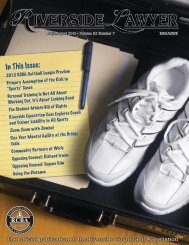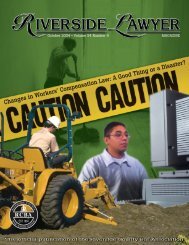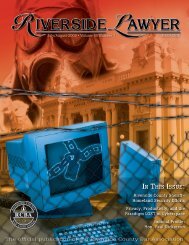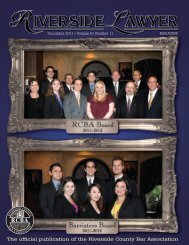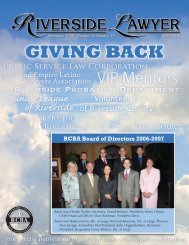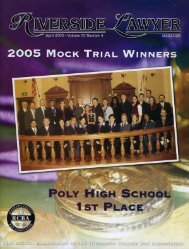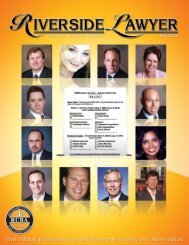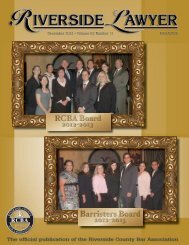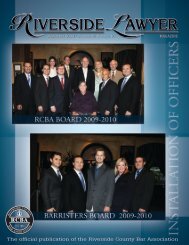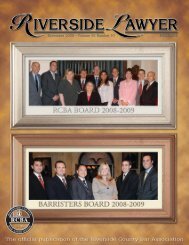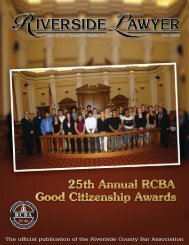In This Issue: - Riverside County Bar Association
In This Issue: - Riverside County Bar Association
In This Issue: - Riverside County Bar Association
Create successful ePaper yourself
Turn your PDF publications into a flip-book with our unique Google optimized e-Paper software.
The Coogan Act: Protecting the Child Actor<br />
by Christopher Buechler Marin<br />
PRINCETON:<br />
Oh my God!<br />
It’s Gary Coleman!<br />
GARY COLEMAN:<br />
Yes I am!<br />
I’m Gary Coleman<br />
From TV’s<br />
Diff’rent Strokes<br />
I made a lotta money<br />
That got stolen<br />
By my folks!<br />
Now I’m broke and<br />
I’m the butt<br />
Of everyone’s jokes,<br />
But I’m here -<br />
The Superintendent!<br />
On Avenue Q -<br />
ALL:<br />
It sucks to be you.<br />
- From “It Sucks to Be Me” from Avenue Q (2003),<br />
Lyrics by Robert Lopez and Jeff Marx<br />
Hollywood legend is rife with stories of young actors<br />
crashing and burning. The cautionary tales associated<br />
with names like Gary Coleman, Lindsay Lohan, Macaulay<br />
Culkin, Drew <strong>Bar</strong>rymore, Jonathan Brandis and others<br />
would seem to paint show business as a monster industry<br />
that eats up children and spits them out (never mind the<br />
majority outliers of well-adjusted former child actors).<br />
However, the trappings of fame are just one element of<br />
these tragic tales. Many of these stories also share themes<br />
of family dysfunction and exploitation that prompted<br />
California lawmakers to take action. The result of that<br />
action is referred to as the “Coogan Act,” named for former<br />
child star and later Uncle Fester on TV’s The Addams<br />
Family, Jackie Coogan.<br />
Jackie Coogan’s tale of woe first came to light when,<br />
at age 23, he sued his mother and stepfather/“manager”<br />
in April 1938 for an accounting of the roughly $4 million<br />
he earned as a child actor. His mother’s response?<br />
“No promises were ever made to give Jackie anything,”<br />
his stepfather adding, “Every dollar a kid earns before he<br />
is 21 1 belongs to his parents. Jackie will not get a cent<br />
of his earnings.” 2 Jackie did get some recovery, but was<br />
struggling financially for a time while working as a young<br />
adult in Hollywood. The publicity surrounding the case,<br />
however, led to more substantive protections for the child<br />
actor.<br />
The Coogan Act is codified primarily in the Family<br />
Code, with a related section in the Labor Code. Jackie<br />
Coogan would probably be primarily interested in Family<br />
Code § 771(b), which designates money earned from an<br />
artistic performance contract under the act as “the sole<br />
legal property of the minor child.”<br />
The contract itself is covered in Family Code §§ 6750-<br />
53. Either party to this contract can petition the court to<br />
approve a child performer’s contract. Contracts subject<br />
to such approval may not be disaffirmed based on the<br />
minority of the contracting child. Also, the child’s parent<br />
or guardian is required to set up a trust account, known<br />
as a Coogan Trust, for the child. The employer is required<br />
to deposit at least 15% of the child’s earnings directly into<br />
this trust account, but the parent or guardian can indicate<br />
a larger percentage be placed in trust. Funds in trust<br />
cannot be withdrawn until the child turns 18 or the court<br />
orders otherwise, and there are guidelines for banks and<br />
investment funds as to the handling of trust assets. If a<br />
parent or guardian fails to set up a trust, the code designates<br />
the Actor’s Fund of America as the default trustee.<br />
Of course, protecting the child’s earnings is only part<br />
of the equation of protecting the child actor. And the<br />
Coogan Act only affects contracts in California. Although<br />
other states have enacted laws protecting child actors in<br />
those states, the protection is not as robust as California.<br />
New York, for example, does not require the trust account<br />
to be a blocked account, and other states still may have<br />
the performance income designated as family income<br />
rather than the child’s separate property. 3<br />
1 The age of majority was 21 before March 4, 1972. Cal. Fam. Code<br />
§ 6502.<br />
2 Henry R. Luce, editor, “The Strange Case of Jackie Coogan’s<br />
$4,000,000”, LIFE, April 25, 1938, at 50.<br />
3 BizParentz Foundation, “Trust Accounts”, http://www.bizparentz.<br />
org/gettingstarted/trustaccounts.html (last visited September 16,<br />
2013).<br />
12 <strong>Riverside</strong> Lawyer, October 2013



